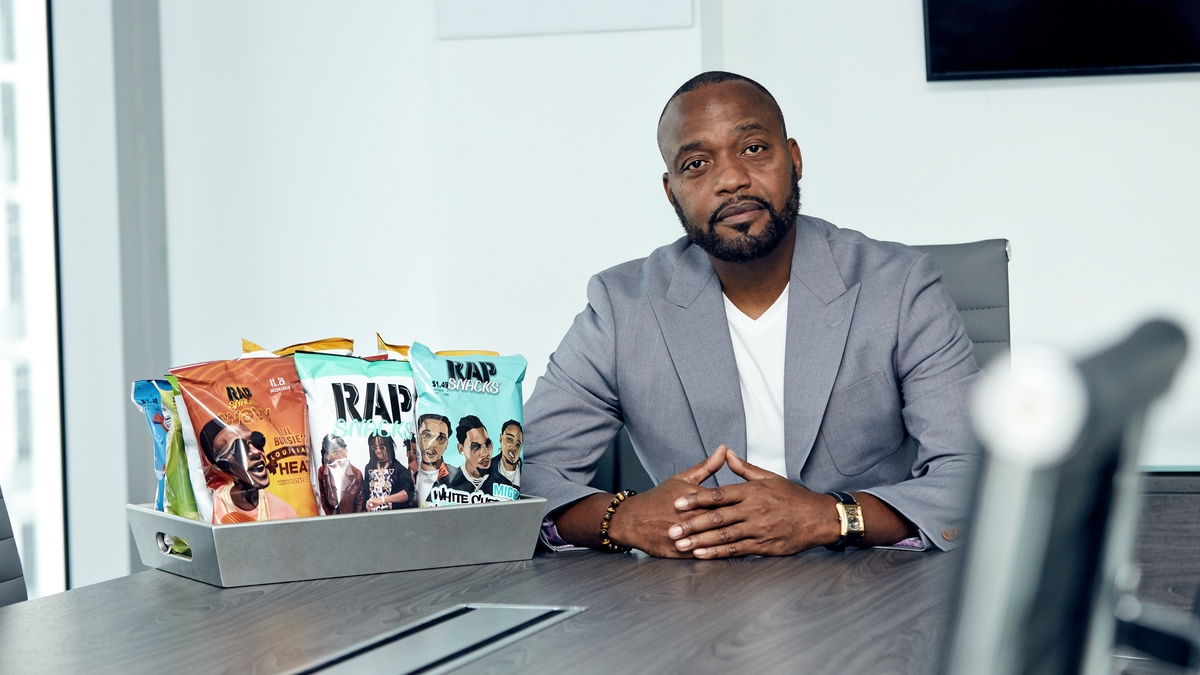It seems like out of nowhere, potato chip bags with rap artists on the packaging suddenly popped up on our favorite corner store shelves. Those chips are part of a company called Rap Snacks, Inc. Its CEO and founder, James Lindsay, told Blavity that eventually Rap Snacks will become one of the most recognized snack food brands in the world.
Only time will tell if Lindsay reaches that goal. But right now, one thing is certain, the Black-owned brand has one of the most distinct packagings in the potato chip industry — with bold flavors to match.
"Everything that we do is an original flavor," Lindsay said. "When I first started the company I was the first one to do a honey barbecue. Now, everyone has one."
Rap Snacks introduced its inaugural flavored potato chips, Bar-B-Quin' with my Honey, in 1994. Back then, rapper Romeo Miller, whom we called Lil' Romeo, graced the package. Now, the company is thriving with over a dozen unique flavor profiles ranging from honey jalapeño potato chips to habanero hot cheese popcorn. And with their expanded flavors, Rap Snacks has increased the roster of hip-hop artists on its packages and made its way into nation-wide Walmarts.
Some might be surprised to learn the chips have a history that exceeds 25 years. But Lindsay, who earned a marketing degree from Cheyney University, isn't new to the snack food industry. He built the company from an idea into a five million dollar business, before hitting a financial cap that required him to take a step back and update his business plan. During the time away, he worked as a brand manager for rapper Meek Mill — both men are from Philly.
"It really helped me open my eyes to who I should put on the bags [and] who I shouldn't put on the bags," Lindsay shared. "At the time Meek was doing lots of music with the Migos."
When Lindsay heard the Migos, he knew the rap trio would become breakout stars. That intuition led him to make Migos the face of Rap Snacks' Sour Cream with a dab of Ranch flavored chips. Consumers almost instantly connected with the image of Takeoff, Quavo and Offset, who were fresh off the success of their 2016 album Bad and Boujee. The Rap Snacks relaunch also came with a new business partnership with rap mogul Master P. All developments couldn't have arrived at a better time.
Fast-forward to now; Fetty Wap, Cardi B, Trina, Lil' Boosie, Lil Yachty and other big rap names have joined artists such as Meek Mill, Master P, Young Joc and Ol' Dirty Bastard on Rap Snacks' packaging. The brand even released an icon edition that features rap legend Biggie Smalls. While there's nothing novel about combining celebrity faces with commercial products, Rap Snacks has a greater mission that includes truly representing the culture. The company is just one of the 2.76 million corporations that make up the mere 9% of Black-owned U.S. businesses.
When Lindsay brainstorms flavor ideas, he works with rappers to craft a taste they enjoy. But even more rewarding, Lindsay is building a company that elevates how Black and brown faces are represented on product packaging.
"If you could do a search of any item that African Americans are presently on, you have Aunt Jemima and Uncle Ben," Lindsay pointed out. "You don't have any packaging that are people of color [who are] thriving. I look at Cardi B and Migos. They are thriving."
Rap Snacks seems to have an authentic and inspiring vision. Even better, they are leading by example and bringing everyone along for the ride — including the vegans. Lindsay shared that his company has partnered with the successful Black-owned plant-based restaurant, Slutty Vegan to produce vegan potato chips. The packaging showcases Slutty Vegan owner Pinky Cole, who made the news when she paid off tuition balances for 30 Clark Atlanta University seniors. This is Black economic mobility and we love to see it.
Lindsay's intentional partnerships with hip-hop artists and Black brands reinforce his mission. Its bigger than music and food. He has positioned himself as a business and community leader who has the resources to pour knowledge into the next generation. With the Rap Snacks Foundation and its BossUp program, Lindsay is paying it forward by teaching others how to build successful businesses as well.
"Rap Snacks is out the box," the entrepreneur said. "It's something that I started selling at the corner store. Now it's at Walmart … it just gives people motivation that we have a market there. Instead of continuing to be consumers, now we are becoming producers. And we're creating our own brands that we can buy. And hopefully that money will go back into the community to help other people coming behind us."
Blavity writer Kyle Walcott contributed to this article.
